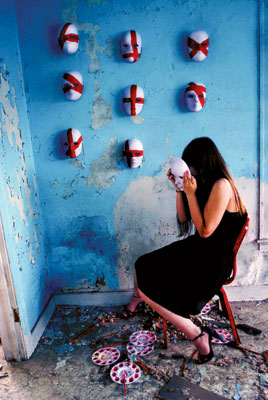All Nonfiction
- Bullying
- Books
- Academic
- Author Interviews
- Celebrity interviews
- College Articles
- College Essays
- Educator of the Year
- Heroes
- Interviews
- Memoir
- Personal Experience
- Sports
- Travel & Culture
All Opinions
- Bullying
- Current Events / Politics
- Discrimination
- Drugs / Alcohol / Smoking
- Entertainment / Celebrities
- Environment
- Love / Relationships
- Movies / Music / TV
- Pop Culture / Trends
- School / College
- Social Issues / Civics
- Spirituality / Religion
- Sports / Hobbies
All Hot Topics
- Bullying
- Community Service
- Environment
- Health
- Letters to the Editor
- Pride & Prejudice
- What Matters
- Back
Summer Guide
- Program Links
- Program Reviews
- Back
College Guide
- College Links
- College Reviews
- College Essays
- College Articles
- Back
"We Wear the Mask" Analysis
Paul Laurence Dunbar’s “We Wear the Mask” is significant because it is a poem that expresses the African Americans constant hiding behind a exterior mask; hiding their true emotions in hopes to avoid public criticism. Because stereotypes are so easily placed on all people, especially blacks at this time, “We Wear the Mask” promotes readers to find deeper truths than the ingenuine emotions we see on the outside. This poem shows persistent humiliation the blacks deal with in attempt to hide their true feelings from the alien society. It is also said that it more beneficial to them to be seen with the mask on so they will not have to be rejected with the world’s lack of sympathy. The last lines of “We Wear the Mask” shows people’s determination to keep their suffrage and natural feelings to themselves and outwardly show happiness and lack of care. The poem closes with a powerful statement: “But let the world dream otherwise, / We wear the mask!’ In conclusion, “We Wear the Mask” depicts the feeling of appearing to be content or happy, which several African Americans felt should be hidden behind the symbolism of a mask.

Similar Articles
JOIN THE DISCUSSION
This article has 0 comments.

I wrote my research paper on this so I thought it would be appropriatete to fully understand the title in order to get the full meaning behind the poem.